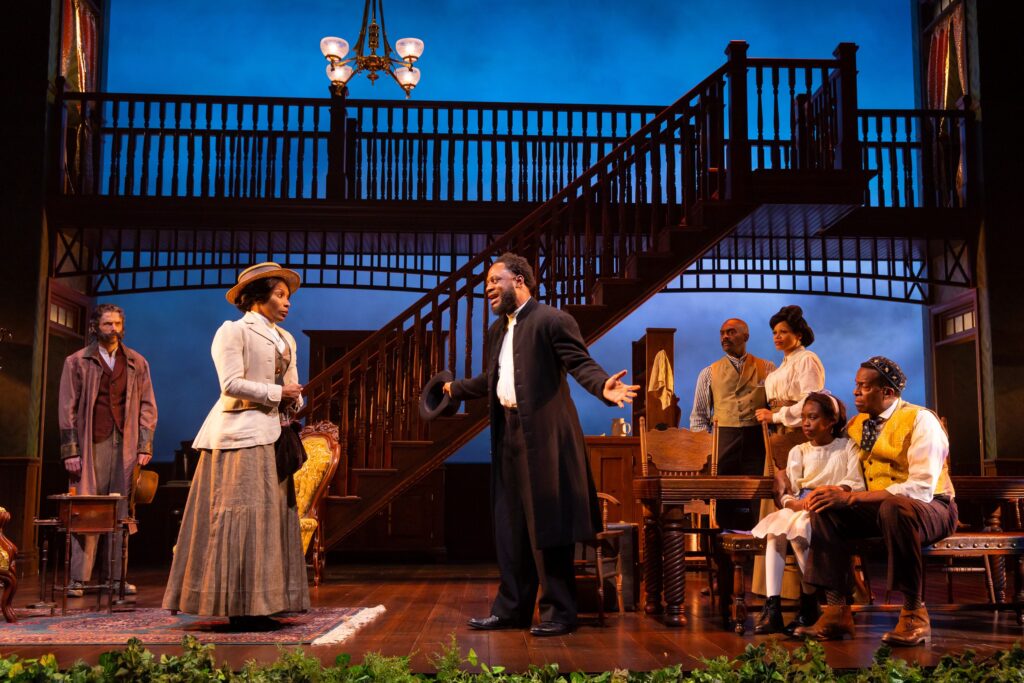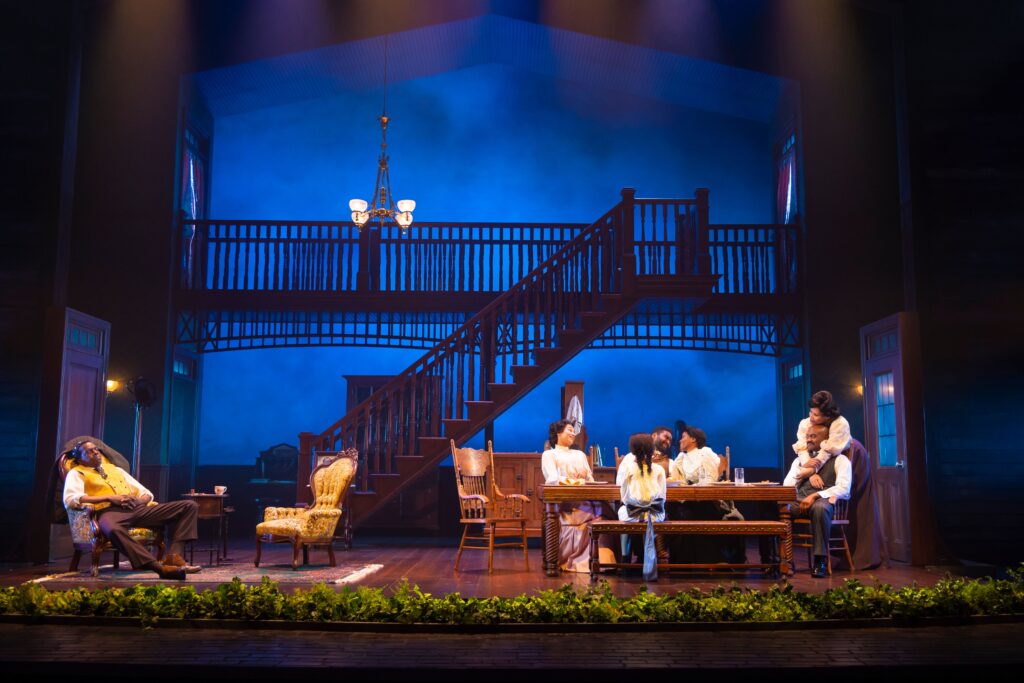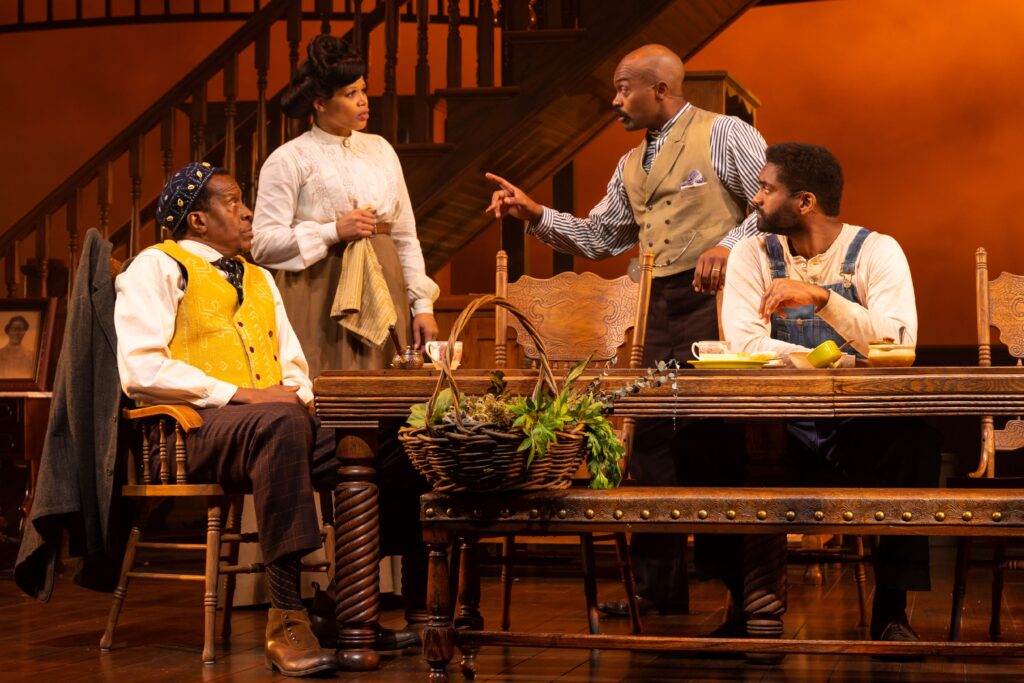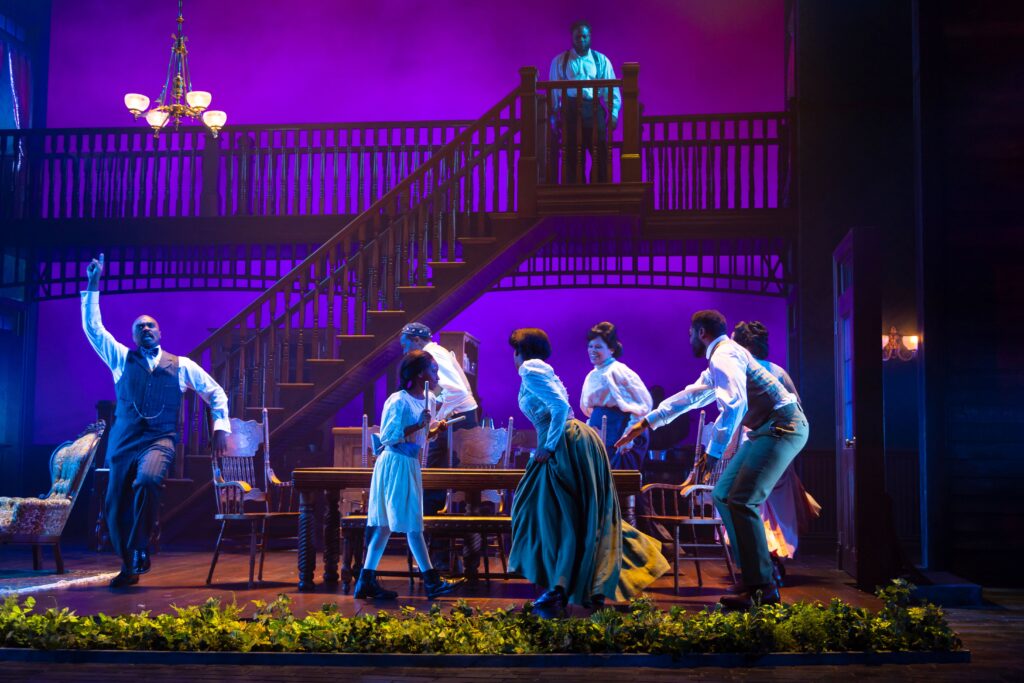
‘August Wilson’s Joe Turner’s Come and Gone’ by August Wilson. Directed by Lili-Anne Brown; Arnel Sancianco, Scenic Design; Samantha C. Jones, Costume Design; Jason Lynch, Lighting Design; Aubrey Dube, Sound Design. Presented by The Huntington Theatre through November 13.
by Shelley A. Sackett
What a pleasure it is to have the Huntington Theatre Company back. With its sleek Narragansett Green walls, gold domed ceiling and cherry red extra legroom seats, an always pleasurable theatrical experience is now also one full of creature comforts. Even more stunning, however, is the magnificent production of August Wilson’s Joe Turner’s Come and Gone, with which the Huntington christened its reopening. If Joe Turner’s footprints lingered long after he had gone, it’s because Wilson’s unforgettable presence (and titular title as the Huntington’s creative patron saint) enveloped the stage.
Other than sporadic trouble understanding and hearing some of the actors, the production is flawless. Arnel Sancianco’s set captures the pressed oak Victorian glory of an architectural era resplendent in its attention to eye candy detail, including a grand staircase and welcoming dining room table. A crystal clear sound system does justice to Aubrey Dube’s acoustic period selections (always a pleasure to hear Mississippi John Hurt sounding authentic but not like he’s singing underwater). And Samantha C. Jones’s costumes (especially the women’s hats) and Jason Lynch’s lighting (which manages to track the sun’s movement) are icing on the cake.
And that’s before we get to the cast’s universally brilliant acting and Lili-Anne Brown’s spot-on, outstanding direction.

First, though, a little historical background is in order. The title, Joe Turner’s Come and Gone, refers to Joe Turney, the brother of former Tennessee Governor Peter Turney. In the late 19th Century, Joe Turney was responsible for transporting black prisoners from Memphis to the Tennessee State Penitentiary, located in Nashville. Instead, Turney abused his role by running a network of “convict leasing.” He was also known for swooping down on innocent freed blacks and illegally enslaving them for seven years, often to work on his own farm. When men turned up missing in black communities, word quickly spread that “Joe Turner’s come and gone.”
Against this harsh backdrop of the Jim Crow lawless post-Civil War America, Wilson introduces us to his cast of vivid characters.
It’s 1911 and Seth and Bertha Holly run a “respectable” boardinghouse in Pittsburgh. Seth (played with pitch perfect comedic timing by Maurice Emmanuel Parent), its owner, inherited the property and business from his parents. He was born to free African-American parents in the North and is a real killjoy. Set in his ways, he is happy to assimilate to the degree he is allowed, and is economically shrewd and heartlessly capitalistic.
Bertha (the sublime Shannon Lamb), his wife of 25 years, is a loving mother to her boardinghouse family. Although she knows her place, she manages to manipulate Seth’s decision-making in subtle yet effective ways. Love and laughter get her by. She embraces Northern ways (including Christianity), but her heart and spirit remain tied to her African ancestors.
Bynum Walker, a 60ish “conjuror” who practices healing arts with herbs, incense and song, is Seth’s foil. As portrayed by Robert Cornelius, Bynum is both as large as a giant and as gentle as a lamb. He is as grounded in his roots and heritage as Seth is in his denial of them. In touch with his inner soul and identity, he offers to help those lost to themselves and others with his powers to “bind.” Bynum is part shaman, philosopher and therapist — and all compassion. He has lived at the Holly’s for a while and moves about as comfortably as if he were a blood relation.
Jeremy Furlow (an exuberant Stewart Evan Smith), 25, is trying to find his identity as a member of the younger generation of newly liberated slaves. He is footloose and itching to travel the nation with his guitar and fancy green suit. In the meantime, he works anywhere that will hire him building whatever needs building. He naively chafes at the racial injustice he encounters and will accept the company of any woman who accepts his as he tries to find his perfect mate.

The only white character in the play, Rutherford Selig (a suitably sycophantic and tone deaf Lewis D. Wheeler) is a peddler known as the “people finder.” He was also a fugitive slave finder, like his father (his grandfather ran the first ships, we’re told, that captured Africans and brought them to America to become slaves). He acts as middleman for Seth’s hand-crafted dustpans and keeps a tight record of everyone he meets on his travels.
Mattie Campbell (an earnest Al-nisa Petty), a young woman who finds Seth’s when she seeks Bynum’s help in binding her to her missing boyfriend, is disappointed in the life that has left her a bereaved mother of two dead babies and a jilted girlfriend. By contrast, the last thing Molly Cunningham (the slinky Dela Meskienyar), another tenant in her mid-20s, wants is to be bound to anyone or anything — except maybe her mama. She is independent, spoiled and totally aware of the power her striking looks and wardrobe afford her.
Into this ersatz family wanders Herald Loomis (brilliantly embodied by James Milford), a former deacon and odd man who dons an overcoat in August, and his skinny 11-year-old daughter Zonia (Gray Flaherty at last Sunday’s matinée). He has the skittish mannerisms of one suffering from post-traumatic stress disorder. He has been travelling from town to town, looking for his wife, Martha Loomis. The last time he saw her was 11 years ago, right before Joe Turner captured and enslaved him for seven years. By the time he was freed, Martha had fled. He’s been on the road looking for her for four years, Zonia in tow.
Wilson is a maestro at creating masterpieces that illustrate the Black human condition in America. Armed with this rich palette of characters and his magic wand of a brush, he paints a picture rich in both human emotion and historical context. He doesn’t polemicize, castigate or lecture, yet he makes his points about racial injustice, Black diaspora, migration and the irredeemable evil and gall of kidnapping and slavery. His wholly fleshed out characters let us through the keyholes of their lives and by the end of the play, we have connected the dots.
The specific plot twists and turns are too numerous (and contain too many spoilers) to detail here, and Wilson is more about the journey than the destination anyhow.. By the end of the almost three hour (with intermission) play, the audience has experienced the pain and promise of the post-slavery years and the power of community to heal and revive a broken and lost soul.
Everyone at the boardinghouse is searching for their missing piece. Unspeakable horrors and disruptions untethered men like Herald Loomis, who has lost his sense of who he is because he cannot remember who he was before he was enslaved. For men like Seth, who has only known life in the North, slavery and its consequences are more hearsay than heartache. He’s more concerned with keeping what’s his in the face of the increased competition post-emancipation northern migration has wrought. He knows the system is, and always will be, rigged against him. His mission is to squeeze through the loopholes unnoticed and differentiate himself from these newly arrived migrants.
Seth is also a pragmatic man who doesn’t feel the need to seek meaning or purpose by way of spirituality or a return to his African roots. Christianity and churchgoing is as much about fitting in as it is about religion. Of Bynum’s shaman-like behavior, he says, “All that old mumbo jumbo nonsense. I don’t know why I put up with it.”
Bynum, on the other hand, is at peace with himself and the world as he finds it. He believes himself to be part of a “grand design,” a belief that ultimately allows him to “swallow any adversity.” For Bynum, his spirituality and helping others re-find themselves become a way of making sense and finding his own purpose in an unpredictable world.
Straddling the two is Bertha, who is as down to earth and practical as Seth but takes comfort in Bynum’s old forms of African healing and mystical practices. One of the highlights of the play is the joyful “Juba” dance around the kitchen table where all but Herald participate and lose themselves in a moment of communal ecstasy. (The Juba dance was originally brought by Kongo slaves to Charleston, S.C.).

By the play’s end, Loomis (and several others) have found their inner song and are on the path to exploring their identity, and the audience is left standing in thunderous applause. Wilson’s words and spirit spin a magic that will resonate long after the last cheer has faded. Highly recommended. For tickets and information, go to: https://www.huntingtontheatre.org/

